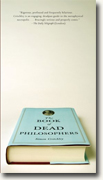The Book of Dead Philosophers
Simon Critchley
book reviews:
· general fiction
· chick lit/romance
· sci-fi/fantasy
· graphic novels
· nonfiction
· audio books
· author interviews
· children's books @
curledupkids.com
· DVD reviews @
curledupdvd.com
newsletter
win books
buy online
links
home
for authors
& publishers
for reviewers

 |
The Book of Dead Philosophers Simon Critchley Vintage Paperback 304 pages February 2009 |
|
Critchley admits up front that writing about how philosophers died is, well, odd, and that reading about such things is perhaps even odder. Then again, there are lots of good reasons to write and read about death. It’s inevitable, after all, the one truly irremediable cipher confronting each of us. We know nothing about death (though plenty about how it gets caused), or would say so if we were truly honest about the limits of our cognitive abilities.
Besides, philosophers are especially good at dying. Not all of them, of course, but the good deaths (the ones that fascinate, the ones that cause the brow to crinkle, the ones that cause us to splutter, wave the storyteller away and take drink with a secret, hidden smile lurking on our lips) tend to be remembered, to be passed on down the line of storytellers. A good death becomes a point of imaginative departure. Here are snippets from Critchley’s wonderful vignettes on my three favorite philosophers. Ludwig Wittgenstein, whom Critchley considers “a saint for our time,” had terminal cancer. Wittgenstein died one night in 1951 with his boots on, in the company of his friend, Mrs. Bevan. Wittgenstein stirred the pot by questioning the questioners: he interrogated the norms of Western philosophy (though he was notably ignorant of its history, as Critchley points out) and caused a wave that has come down to us as post-modernism, or more generally as a bumper sticker: Question Authority. For Wittgenstein, the authority was language, and it needed close scrutiny: words, slippery with the oil of human intercourse, had to be refined into the fuel of truth. That last night, when Mrs. Bevan told him his friends would be coming to visit the next morning, he asked her to tell them “I’ve had a wonderful life.” Heraclitus, known as the weeping philosopher because he was so distressed at the crappiness of our moral fiber, may have shuffled off his mortal coil by drowning in cow dung. He thought it would draw out the bad humours—and he was always of fairly poor humor. His surviving writings (or sayings, since he wasn’t the type to write things down; “everything flows,” he said, nothing stays the same and permanence is an illusion) are wonderful: droll, biting and often mysterious: “Souls have a sense of smell in Hades.” Or perhaps he didn’t drown in shit. Another version of his death has it that his friends couldn’t scrape the crap off the philosopher and had to stand by, watching in horror, as dogs devoured him. So it goes. Diogenes the Dog, the Cynic, always a willful bastard, is said to have committed suicide by holding his breath. And thousands of miles away and on the same day Alexander the Great died, at that. The philosopher would have been about 90. Both Heraclitus and Diogenes lived in an era when Greece was having a lot of intercourse with India, so it’s not so surprising that both philosophers have strong resonance with ancient Hindu and Buddhist thought. Heraclitus saw through the veil of maya and Diogenes tackled the ego by living like an animal. (For years, all he carried was a staff and a bowl. Then one day he saw someone drinking out of her cupped hands. He threw his bowl away.) Another story has it that Diogenes died from eating raw octopus. One thing I learn for sure from Critchley’s marvelous book is to be careful what I put in my mouth. We should also be careful about what we put in our heads, which is to say, we should be generous with good books. Critchley has read a lot of good books (many of them, no doubt, in odd, difficult and long-dead languages) and gives them back most generously. Feed your head; read some dead philosophers. Originally published on Curled Up With A Good Book at www.curledup.com. © Brian Charles Clark, 2009 |
|
|
|
 Click here to learn more about this month's sponsor! |
|
| fiction · sf/f · comic books · nonfiction · audio newsletter · free book contest · buy books online review index · links · · authors & publishers reviewers |
|
| site by ELBO Computing Resources, Inc. | |
 And of course we’re fascinated with ciphers, mad to construe their hidden meanings and to make sense out of what, so often, is a devastation for those of us who go on living.
And of course we’re fascinated with ciphers, mad to construe their hidden meanings and to make sense out of what, so often, is a devastation for those of us who go on living.